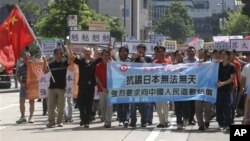The dispute between China and Japan over the detention of a Chinese fishing boat captain by Tokyo has brought diplomatic relations between the Asian powers to their lowest level in years.
Members of the Hong Kong Confederation of Trade Unions were in the streets to protest Japan's detention of Chinese fishing boat captain Zhan Qixiong. They chanted slogans including "Japan must compensate" and "Down with Japanese militarism."
The Chinese captain had been held since his fishing boat collided with two Japanese patrol boats September 7. He arrived back in China on a chartered airplane on Saturday.
China had suspended ministerial-level contacts and canceled planned meetings with Japan while demanding Zhan's release. And, China continues to press for an apology and compensation, something Japanese Prime Minister Naoto Kan on Sunday rejected. "Senkaku islands are Japanese territory. From that point of view, an apology or compensation is unthinkable. I have no intention at all of meeting the demand," he said.
Mr. Kan told reporters in Tokyo that the group of uninhabited islands in the East China Sea where the man was detained is an integral part of Japanese territory. The islands are claimed by both countries. The surrounding waters are rich fishing territory and are believed to hold undersea natural gas and oil reserves.
Mr. Kan's remarks followed a statement from China's Foreign Ministry on Saturday that called the captain's detention unlawful and asked Japan to apologize. Upon his arrival home, Captain Zhan said he firmly supports the Chinese government's position and that he did nothing illegal. "The Diaoyu Islands are a part of China. I went there to fish. That is legal. Those people (the Japanese) grabbed me. That was illegal," he said.
Some in the Japanese media criticized Tokyo's decision to free the captain as giving in to Chinese pressure.
Tensions Still High Over Japanese Detention of Chinese Fishing Boat Captain











